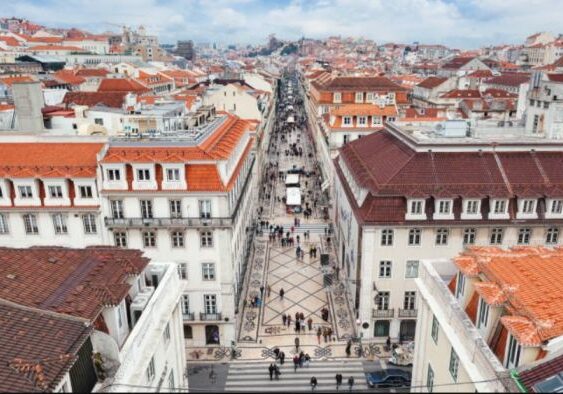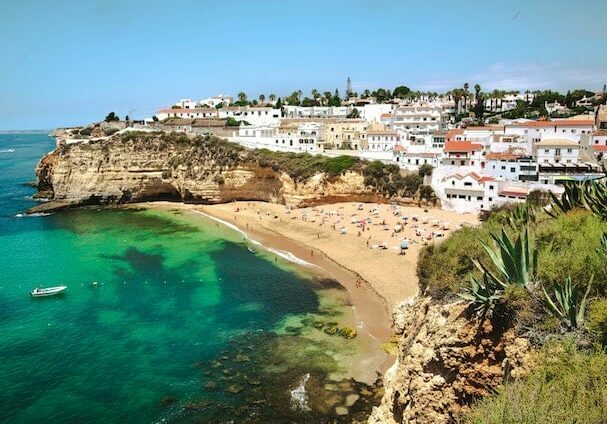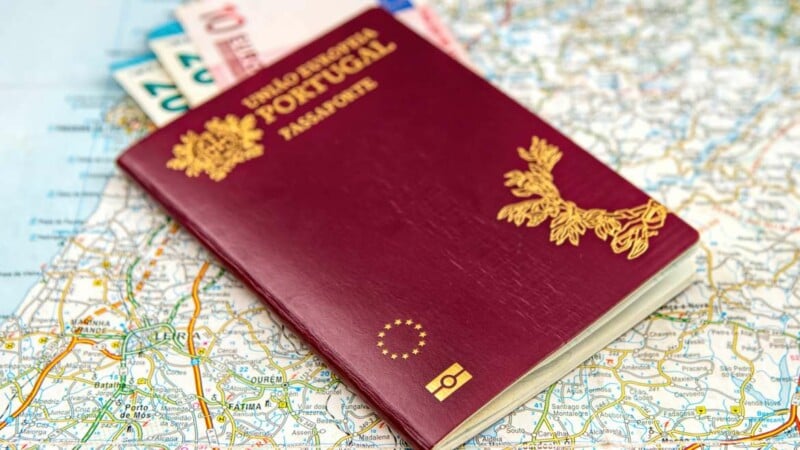Updated: July 3, 2025
Are you feeling limited by a single passport? As more people look beyond their borders for new opportunities, Portugal has emerged as a top choice for residency and citizenship. Known for its stunning beauty, vibrant culture, and high quality of life, it’s easy to see why so many are drawn to the country.
But what if you could unlock an even higher level of freedom and opportunity in Portugal, and across the EU? That’s precisely what Portugal dual citizenship offers. For many, acquiring Portuguese citizenship doesn’t mean giving up your current nationality, though this will largely depend on your home country.
In this article, we’ll look at how dual citizenship in Portugal works and the options available to you.
You’ll also find out more about:
- Benefits of Portuguese dual citizenship
- How to get dual citizenship in Portugal
- Visa options for moving to Portugal
- US Policy on Portuguese Dual Citizenship
What is dual citizenship?
Dual citizenship is a legal status where an individual is recognized as a citizen of two countries simultaneously.
This status allows individuals to enjoy the benefits and privileges of both countries, including the right to live, work, and travel freely in both jurisdictions.
Depending on the country, dual citizens also have legal obligations tied to each nation, such as tax responsibilities or compulsory military service.
While dual citizenship provides global mobility and access to social benefits, it requires careful navigation of each country’s laws and potential conflicts, such as diplomatic protection or tax compliance.
Does Portugal allow dual citizenship?
Yes, Portugal allows dual citizenship. The country does not require individuals to renounce their previous citizenship when obtaining Portuguese nationality. This means individuals can hold citizenship in Portugal and another country simultaneously.
This policy applies to all pathways to citizenship, including by descent, marriage, naturalization, investment, or under the Jewish Law of Return. This is a common practice, and many people, including US citizens, choose to obtain Portuguese citizenship while retaining their original nationality.
Apart from finding a viable pathway to citizenship, applicants will also need to meet other requirements, including proof of Portuguese language proficiency at an A2 level, a clean health record, proof of residency, and a clean criminal record.
Portugal’s acceptance of dual citizenship enables individuals to enjoy the benefits of Portuguese citizenship—such as EU rights, visa-free travel, and access to public services—while retaining the rights and privileges of their original nationality.
Benefits of Portuguese Dual Citizenship
From smooth travel within the European Union to broader career opportunities and access to Portugal’s excellent healthcare and education systems, dual citizenship opens avenues for both personal and professional growth.
Here are a few benefits of Portugal’s dual citizenship with the US and with other nationalities whose home countries allow dual citizenship.
- Live freely in Portugal: With Portuguese dual citizenship, US nationals and other foreign nations gain the right to live in one of Europe’s safest and most picturesque countries. This means access to affordable healthcare, world-class education, expanded career opportunities, and a vibrant lifestyle without immigration restrictions.
- Visa-free access and European Union travel: Portuguese citizenship provides unrestricted access to the 27 EU member states and visa-free travel to over 180 countries worldwide. This benefits frequent travelers and professionals seeking global mobility, simplifying international travel, and enhancing business opportunities.
- Affordable cost of living: Portugal offers a favorable cost of living compared to the US and many Western European nations. For example, the cost of living in Lisbon, Portugal’s capital and priciest city, is still almost 40 percent lower than the cost of living in Washington D.C.
- High quality of life and safety in Portugal: Residents of Portugal enjoy a high quality of life with a warm climate, rich culture, and excellent public services. Portugal is the seventh safest country in the world according to the Global Peace Index. It offers a safe environment in which to live and raise a family, with very low crime rates. For comparison, the USA ranks 132 on the index.
- Attractive tax benefits: Portugal has double tax agreements and treaties with many different countries, including the US. This helps dual citizens to avoid being taxed twice on the same income. Additionally, Portugal’s IFICI tax regime (Tax Incentive for Scientific Research and Innovation) offers qualifying highly skilled workers a flat 20 percent tax rate on local income and foreign income exemptions for 10 years, making it a valuable replacement for the former NHR program (earning its label as the NHR 2.0 in Portugal).
How to Get Dual Citizenship in Portugal: Eligibility Requirements
To obtain Portuguese dual citizenship, you must meet specific residency, ancestral, or investment-based criteria depending on your situation. Each pathway has specific requirements, and proper documentation is crucial.
For example, proving ancestry or the validity of your investment plays a key role in a successful application.
Portuguese citizenship by naturalization through residency
Foreign nationals holding legal residency in Portugal for at least five years can apply for citizenship through naturalization. Fortunately, the Portuguese government makes residency in Portugal quite accessible.
You can obtain legal residency through one of Portugal’s many visa programs, such as the Passive Income Visa, Digital Nomad Visa, or Golden Visa. We explore some of the popular options later in this guide.
Portuguese citizenship by investment
The Golden Visa program allows individuals to secure residency and eventual citizenship by making qualifying investments, such as contributing to research and cultural heritage projects. Investments start at €250,000. After maintaining the investment and residency for five years, applicants can apply for citizenship. You can find out more in our guide to Portugal citizenship by investment.
Portuguese citizenship by descent

If you can demonstrate that you have Portuguese ancestors, you may be eligible to claim Portuguese citizenship by ancestry. This process is governed by Portuguese Nationality Law, which is based on the principles of jus sanguinis (inheritance from Portuguese ancestors) and territoriality (birth within Portuguese territory).
The citizenship application process involves providing documentation that proves your Portuguese ancestry. You must demonstrate a direct lineage to a Portuguese ancestor by submitting Apostille documents, such as birth certificates, marriage certificates, and other relevant records.
However, obtaining Portuguese citizenship is not just about tracing your ancestral lineage. Eligibility is contingent upon your parents or grandparents being officially recognized as Portuguese citizens.
This legal requirement sets the process apart from simple genealogy records and emphasizes the importance of a direct familial link to Portuguese citizenship.
Portuguese citizenship by marriage
If you have been in a de facto relationship with or married to a Portuguese citizen for three years, you can obtain Portuguese citizenship through spousal eligibility.
To apply for citizenship, you will need to provide the necessary documents, including a marriage certificate and a copy of your spouse’s Portuguese citizen card.
Portuguese law does not impose a minimum residency requirement for this process, and your citizenship will remain valid even if you divorce or separate in the future.
Portuguese citizenship under the Jewish Law of Return

The law acknowledges the historical expulsion of Sephardic Jews from Portugal in 1496 and extends citizenship eligibility to their descendants. This initiative enables individuals with Sephardic Jewish ancestry to reconnect with their Portuguese heritage and acquire Portuguese citizenship.
Since 2015, over 250,000 Jews of Sephardic descent have applied for Portuguese citizenship through this program, with more than 75,000 applications accepted, according to Global Citizen Solutions. Successful applicants have immediate access to the European Union.
In March 2024, the Portuguese government announced that they would change the legislation affecting Portuguese Sephardic citizenship applications, adding an extra condition for all applicants.
From April 2024, Sephardic descendants can still obtain Portuguese nationality. However, in addition to proving their links to a Sephardic community of Portuguese origin, all applicants will be required to have legal residence in Portuguese territory for at least three years, consecutive or interpolated.
Portuguese citizenship by adoption
You can also obtain Portuguese citizenship through adoption. Portuguese citizens can adopt children aged 0 to 18, which may lead to potential citizenship for the adoptive child.
Prospective parents must establish their identity, residency, marital status, and financial stability to initiate the adoption process. This process typically takes up to 18 months and involves multiple interviews and assessments.
Upon successful completion of the adoption, the child automatically acquires Portuguese citizenship.
Eligibility for Portuguese citizenship by adoption requires meeting the following criteria:
- The adoptive parents must have legal residency in Portugal for at least five years.
- Applicants must demonstrate proficiency in the Portuguese language and an understanding of Portuguese culture.
- Written consent from the biological parents or guardians is needed if the child is a minor.
- Prospective parents should show a genuine interest in Portuguese life.
- Valid identification, proof of adoption, and a court order for Portuguese citizenship are required.
- Applicants must undergo all required medical examinations and provide proof of vaccinations in accordance with regulations.
Citizenship through residence in Portuguese overseas territories
You can claim Portuguese citizenship in certain cases if you are a resident of one of the following former Portuguese colonies:
- Angola
- Cabo Verde
- Portuguese India
- Guinea-Bissau
- East Timor
- Macao
- Mozambique
- São Tomé and Príncipe
However, for this option, you will need to prove that you are either a descendant of a Portuguese national or part of a community that practices Portuguese traditions and values.
Portuguese Nationality Law Update: June 2025
New changes to Portugal’s Nationality Laws have been proposed, where the residency requirement before applying for nationality may increase from five to ten years (or seven years for CPLP nationals). This is currently a draft proposal and is not yet officially law. Read the latest updates on the Portugeuse Nationality Law.
Visa Options for Moving to Portugal
For most foreigners, the first step toward citizenship starts with residency. Take a closer look at the most popular visa options for gaining residency in Portugal.
Portugal D7 Visa
The D7 Visa, introduced by the Portuguese government in 2007, allows non-EU/EEA/Swiss citizens who have a regular passive income to apply for residency in Portugal. This passive income can come from pensions, transferable equity, real estate, intellectual property, or financial investments.
Commonly referred to as the Retirement Visa or Passive Income Visa, the D7 Visa is particularly popular among non-EU retirees looking to establish a base in Portugal and enjoy the country’s beautiful landscapes and high living standards. To be eligible for the Portugal D7 Visa, applicants must:
- Demonstrate a minimum monthly passive income of €870
- Provide proof of residence in Portugal
- Have a clean criminal record
- Spend a minimum of 16 months in Portugal over a two-year period
One key benefit of the D7 Visa – along with all other visas in Portugal – is that it allows holders to apply for Portuguese citizenship after five years of legal residency in Portugal, provided they meet the requirements.
Portugal Digital Nomad Visa (D8 Visa)

Part of Portugal’s broader initiative to attract digital nomads, the D8 Visa allows non-EU/EEA nationals to stay in Portugal (a temporary visa is up to one year, while a long-term visa grants a renewable residence permit for up to five years).
The main requirement of this visa is that applicants will need to demonstrate that they earn at least four times the Portuguese minimum wage (at least €3,480 in 2025) and have at least €10,440 in savings (the minimum wage of €870 x 12 months of the year) to support themselves. This increases by 50 percent per parent or spouse, and 25 percent per child dependent.
Visa holders can work from various locations throughout the country, including co-working spaces, cafés, or the comfort of their homes.
One of the D8 Visa’s subcategories permits family reunification, allowing you to bring your spouse, children, or other dependents to Portugal under specific conditions.
Portugal Golden Visa program

To qualify, you’ll need to make an investment of at least €250,000 – €500,000 into the arts or national heritage project, scientific research, job creation, or venture capital or a private equity fund.
You will also need a clear criminal record, come from a non-EU/EEA country, and spend an average of at least seven days in Portugal per year.
Portugal D3 Visa
The Portugal D3 Visa is a priority settlement visa aimed at attracting highly qualified professionals to Portugal. Also known as the Portugal Highly Qualified Activity Visa or the Highly Qualified Individuals Work Visa, this special long-term visa can be obtained by individuals with either a confirmed work contract or a self-employed contract to provide services to a Portuguese company.
This visa is designed for those with a promise of employment, a promise of a self-employed contract, or a valid self-employed contract in Portugal, with a minimum duration of one year. It allows the visa holder and their family to enter the country and apply for a residence permit that is initially valid for two years.
Requirements for the D3 Visa include:
- A valid employment contract or self-employed contract valid for at least one year
- A clean criminal record
- Proof of adequate qualifications to carry out the highly skilled work
- Proof that the annual expected salary is at least 1.5 times the national average gross annual salary or three times the social support index
After legally residing in Portugal for 18 months, holders of the D3 Visa can apply for the European Union (EU) Blue Card. This Blue Card permits them to live and work in 25 EU countries (excluding Ireland and Denmark). However, if D3 Visa holders wish to relocate to another EU country after 18 months, they must apply for that specific country’s Blue Card.
Family Reunification Visa

With the Family Reunification Visa, any family member you bring to Portugal will receive a valid residence permit for the same duration as yours. For example, if you have a two-year residency permit, your spouse or partner will be granted a residence permit for the same two-year period.
If you hold a permanent residence permit, the D6 Visa is valid for up to two years. This permit can also be renewed and extended as long as family ties continue.
Non-EU family members with the D6 Visa will have the same rights as Portuguese nationals in employment, education, healthcare, social security, and tax benefits. Just like all other visas, D6 Visa holders can also apply for Portuguese citizenship after living in Portugal for five years.
How to Get Portugal Dual Citizenship: Step-By-Step Application Process

Step 1: Fill out the application form.
Step 2: Submit your application form, along with all applicable documentation (proof of clean criminal record, certificate of language proficiency, proof of residency, parental lineage, marriage certificate, etc.) and application fees, to the Portuguese Consulate if applying from your home country or to the Registry Office if applying from Portugal.
Step 3: Your application will be processed by the Registry Office to determine whether you qualify for citizenship. If you are not eligible and your application is denied, the Registry Office will provide a reason.
Step 4: If you are eligible for citizenship, the Registry Office will send you a letter of congratulations and inform you that your application was successful. This application process could take anywhere from six months to one year or more. And there you go, you then have Portugal dual citizenship and can enjoy the range of benefits that come with it.
Can US citizens get Portuguese dual citizenship?
According to the Bureau of Consular Affairs at the US Department of State, the United States permits dual citizenship but does not officially endorse or promote it. US citizens acquiring another nationality are not required to relinquish their American citizenship, but they must continue to fulfill their obligations, such as filing US taxes on worldwide income.
The US government acknowledges dual citizens’ rights and responsibilities, but it also emphasizes that allegiance to the United States must remain intact, particularly in national security matters.
Best pathways to dual citizenship for US nationals
Many US citizens seeking Portugal dual citizenship opt for becoming Portuguese citizens through naturalization after five years of residency if they are unable to prove Portuguese ancestry or are not married to a Portuguese citizen.
At that time, they would need to meet the same requirements for citizenship, namely:
- A clean criminal record certified by the Portuguese Agency for Immigration, Migration, and Asylum (AIMA)
- Evidence of Portuguese language proficiency
- A clean health record
- Proof of your five years of Portuguese residency
Best Places to Live in Portugal for Dual Citizens
If you’re looking for a permanent home in Portugal during residency in Portugal or after obtaining Portugal dual citizenship, here is a quick overview of some of the best areas to look into:
Lisbon: Best for entrepreneurs, digital nomads, and city lovers
Portugal’s lively capital is a hub of innovation and international business. It’s ideal for entrepreneurs and professionals who enjoy a dynamic lifestyle and international diversity. With a booming startup scene, international schools, and a mix of modern and historic charm, Lisbon is ideal for building a business and enjoying big-city perks.
Lisbon is also home to Portugal’s largest international airport (Humberto Delgado Airport), offering direct flights to the US, UK, and major global cities, making cross-border travel to your other home country simple and efficient.
Porto: Best for creatives and remote workers
Known for its historic charm and artistic spirit, Porto is perfect for remote workers, freelancers, and creatives. The city has a vibrant cultural scene, more affordable housing compared to Lisbon, and a growing tech presence. Porto’s international airport (Francisco Sá Carneiro Airport) also makes traveling easy.
Cascais: Best for families and luxury living
Safe, upscale, and close to international schools and beaches, Cascais combines a suburban feel with easy access to Lisbon. Cascais is known to offer larger properties for families, and schools like IPS Cascais British International School, and the International Christian School of Cascais offer top academic opportunities for children, too.
The Algarve: Best for retirees and beach lovers
Popular with retirees for its year-round sun and relaxed pace, the Algarve also has a strong healthcare infrastructure and English-speaking communities. Faro Airport caters to all travel needs.
With stunning golden beaches like Praia da Marinha and Praia da Falésia, and beachfront properties galore, beach lovers make the Algarve their top pick. Top destinations in the region include Lagos (especially popular among US expats), Albufeira, and Vilamoura.
Braga: Great for young professionals and budget-conscious families
Braga offers an excellent quality of life at a lower cost than Lisbon or Porto. It’s a smart choice for young families or professionals working remotely. The city is an hour from Porto Airport, making travel convenient while keeping living expenses manageable.
With leafy parks, excellent restaurants, family-friendly festivals (like the Braga Romana and the São João festivals), and a growing tech community, Braga offers a peaceful lifestyle with tons of things to do throughout the year.
Starting Your Journey to Portuguese Dual Citizenship
If you’re ready for the journey toward dual citizenship in Portugal, the team at Global Citizen Solutions knows the ins and outs of the process and will be able to advise you on the best possible path for your unique needs.
And once you’re ready to make the move, Goldcrest will help you find a permanent home that fits your requirements and desires, whether it’s a sunny apartment in Lisbon or a quiet beachfront retreat in the Algarve.
Goldcrest: How We Can Help You
Goldcrest is a buyer’s agent that is based in Lisbon. We provide expert, impartial advice on real estate investments and how to buy property in Portugal. From scouting out the perfect property through to property acquisition, we have you covered throughout the process.
If you are looking to purchase property in Portugal, don’t hesitate to get in touch. Our team of skilled experts is available to solve all your real estate doubts, helping you with the property search and offering insightful expertise and strategic advice.
Why choose Goldcrest?
- Local knowledge: With offices located across Portugal, our presence nationwide allows us to assist you personally across the country.
- Independent service: As an independent buying agent, we do not represent any development or project. Our service is entirely tailored toward each individual client, providing you with everything you need to secure the perfect property at the best possible price. As an impartial advisor on the market, we work solely on behalf of our client and provide a service tailored to your needs and requirements.
- Streamlined process: Our real estate agents speak English and Portuguese, and our service is completely focused on providing you with a hassle-free buying experience, saving you time.
- Experienced team: Our expert real estate team has a vast local knowledge of the Portuguese property market. We have cutting-edge technology and metasearch tools at your disposal to provide full market coverage, ensuring the best investment choices and negotiated prices.
- Network of partners: We have a close network of partners, including lawyers, property management services, builders, architects, designers, and landscape gardeners, again saving you time and hassle by providing you with trusted experts in their field of work.
Frequently Asked Questions about Portugal Dual Citizenship
What is dual citizenship, and does Portugal allow it?
Dual citizenship means holding citizenship in two countries simultaneously. Portugal permits dual citizenship. With Portuguese dual citizenship, applicants can retain their nationality while becoming Portuguese citizens, provided their original nationality also permits dual citizenship.
What are the Portugal dual citizenship requirements?
The primary pathways to Portugal citizenship or dual citizenship include:
- By descent: For those with Portuguese ancestors
- By marriage: Spouses of Portuguese citizens are eligible
- By investment: Through programs like the Golden Visa, which grants residency in Portugal, but can lead to citizenship after five years
- By naturalization: After living in Portugal for five years
- By the Jewish Law of Return: For Sephardic Jews with ancestral ties to Portugal
Language proficiency and a clean criminal record are also required to qualify.
What are the benefits of Portuguese dual citizenship?
Key benefits include:
- The right to live, work, and study in Portugal and the EU.
- Visa-free travel to over 180 countries.
- Access to Portugal’s affordable healthcare, education system, and high quality of life.
- The ability to pass citizenship to descendants
Can I lose Portuguese citizenship if I acquire another?
No, Portugal allows dual citizenship, so acquiring another nationality will not result in the loss of Portuguese citizenship.
What taxes will I pay as a dual citizen of Portugal?
Portugal taxes residents on their worldwide income. However, Portugal holds double taxation agreements and treaties with many countries, helping to avoid its citizens getting taxed twice on the same income.
Does Portuguese dual citizenship provide EU benefits?
Yes, Portuguese citizenship grants the right to live, work, and travel across the European Union, as well as access to EU education and healthcare systems.
Can children of Portuguese dual citizens automatically become citizens?
Yes, children born to Portuguese citizens can automatically acquire dual citizenship in Portugal, even if born outside Portugal, ensuring the continuity of citizenship for future generations.
Does Portugal allow dual citizenship with US nationals?
Yes. Both the United States and Portugal allow dual citizenship. This means you can hold both nationalities at the same time, keeping your citizenship in the USA while becoming a Portuguese citizen, too. However, you’ll need to meet the requirements for Portuguese citizenship and still fulfill your US obligations, such as tax filing.
How to get Portuguese citizenship through descent?
You can obtain Portuguese citizenship by descent if you have Portuguese parents or grandparents who were officially recognized as citizens of Portugal. You’ll need to prove your direct lineage with official documents (like birth and marriage certificates).
Can a US citizen get Portuguese citizenship?
Yes, US citizens can apply for Portuguese citizenship through several pathways: By descent, marriage, naturalization (after five years of residency), or under the Jewish Law of Return for Sephardic descendants.
How long does it take to get Portuguese dual citizenship?
The timeline varies by route to citizenship. For example, if you are opting for citizenship by naturalization, it requires five years of residency first, then it could take up to 6-18 months for processing. Citizenship by marriage or descent will usually take less time than this, as it does not require five years of residency.
Factors such as document preparation, application backlog, and consular processing times can affect the timeline.
Can a US citizen get a Portuguese passport?
Yes, once you become a Portuguese citizen, you can apply for a Portuguese passport. You can submit an application online or at the Portuguese passport office.
What are the common reasons applications for dual citizenship in Portugal are denied?
Applications may be denied due to:
- Insufficient or incorrect documentation
- Failure to prove direct descent from a Portuguese citizen
- Criminal record or legal issues
- Failure to meet residency requirements
Consulting Portugal immigration experts like Global Citizen Solutions can help reduce the risk of rejection.
How does Portugal’s dual citizenship policy compare to other European countries?
Portugal has one of the more flexible and welcoming dual citizenship policies in Europe. Portugal allows you to retain your other citizenship and provides multiple pathways to citizenship as well.
